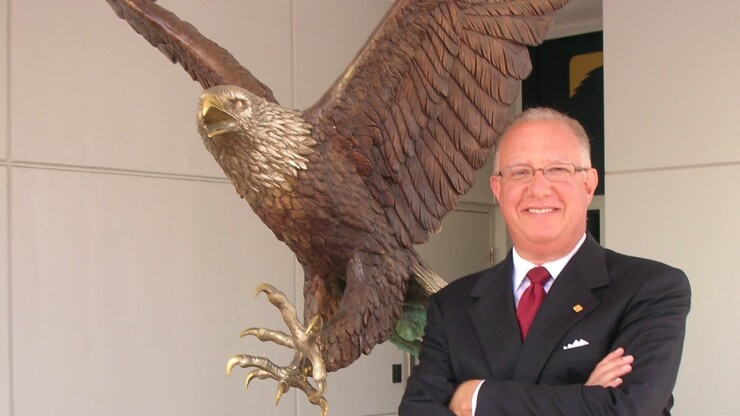Ron Paul, a successful Washington, D.C.-area real estate developer who founded Eagle Bancorp in 1998 and was named one of
The Federal Reserve imposed the ban, which was announced late Tuesday. Paul, who resigned as chairman and CEO of the Bethesda, Maryland-based Eagle in March 2019, agreed to the enforcement action, which included a $90,000 fine.
The Fed levied a $9.5 million civil money penalty on the $10.9 billion-asset Eagle, also, in connection with the same issue.
Moreover, the Securities and Exchange Commission fined Paul $431,000 and Eagle $13.4 million for failing to disclose the insider loans and for making false and misleading comments to investors.
According to the Fed, Eagle lent $99 million to Paul-controlled entities between 2015 and 2018 without disclosing the loans to the company's board as required by Regulation O. That rule requires insider loans greater than $25,000 or 5% of an institution's unimpaired capital be "approved in advance by a majority of the board of directors of that bank."
"At the end of the day, there were people who turned a blind eye to this," said David Weber, a Maryland attorney and clinical assistant professor of accounting at Salisbury Maryland's Perdue School of Business. "The fact this wasn't discovered raises a lot of questions about corporate governance and the leadership of the bank."
The Federal Reserve noted in its prohibition order that the loans to Paul have been repaid in full, except for one "which is currently performing." That fact likely played a crucial role in how regulators determined Paul's punishment. While $99 million is an "astonishing amount" for an insider lending violation, Paul was almost certainly given credit for satisfying his obligations to the bank and for promptly admitting to misconduct, Weber said.
Though costly, Wednesday’s settlement brings the $11.2 billion-asset company a step closer to resolving legal and regulatory issues that have hampered it since 2019.
"It probably played a significant role in what is a comparatively low" monetary penalty, said Weber, who also served as supervisory counsel and a chief of enforcement at the Federal Deposit Insurance Corp. and as assistant inspector general for investigations at the SEC.
"If a teller stole $2,500 from his or her drawer, there would be punishment that would come much quicker than three years and might even involve prison," Weber added.
Paul is now the second Eagle executive to be barred from banking as a result of the insider-lending issues. Lawrence Bensignor, the company's former general counsel,
Regulators have been particularly sensitive to insider lending since the 1990s, after a
Specifically, insider abuse was a significant factor in 35% of the bank failures studied. According to Weber, the study defined insider abuse as self-dealing, undue dependence on the bank for income or services by a board member or shareholder, inappropriate transactions with affiliates, or unauthorized transactions by management officials.
"This plainly would include violations of Regulation O, such as those found in the case of Eagle Bank and Ron Paul," Weber said.
The agreement with the SEC, also announced on Tuesday, came after Eagle agreed in June to pay the agency $12.6 million to settle a separate investigation into
News of Paul's insider loans first came to light in December 2017, when an anonymous investor claimed to have uncovered evidence of an insider-lending scheme involving Paul and unnamed directors. The investor claimed Paul and other insiders treated the bank "as their own personal piggy bank" in a report posted online on Dec. 1. Paul and Eagle
Susan Riel, president and CEO of Eagle Bancorp and its bank subsidiary, EagleBank, said Tuesday in a press release that she was grateful the company can close the books on the episode and "continue our focus on running one of the most profitable community banks in the Washington, D.C., region."
Christopher Marinac, director of research at Janney Montgomery Scott in Atlanta noted that Eagle historically traded at a premium to its price-to-tangible-book-value ratio, but that the premium has dissipated over the past three years, as the company has struggled with questions about insider lending and corporate governance.
"We are not anticipating a premium valuation for a while until EGBN re-establishes itself as a mid-cap bank stock alternative with investors," Marinac wrote Wednesday in a research note.
Interestingly, Eagle has continued to perform relatively well despite the regulatory woes. Earnings through the first six months of 2022 totaled $71 million, including the impact of the $13.4 million SEC payment, which it had agreed to in principle prior to Tuesday's announcement. Marinac characterized Eagle's current return on assets of 1.20% as "reasonable."
Since 2020, when its legal fees connected to the insider-lending issues began to mount, Eagle has spent more than $31 million on professional legal and accounting fees.
In April 2021, Eagle agreed to pay $7.5 million to
Paul began his career as a commercial real estate developer. As a banker, Paul put familiarity with the Washington, region's real estate market to good effect, building a sizable portfolio of CRE loans that seldom suffered significant credit losses.






